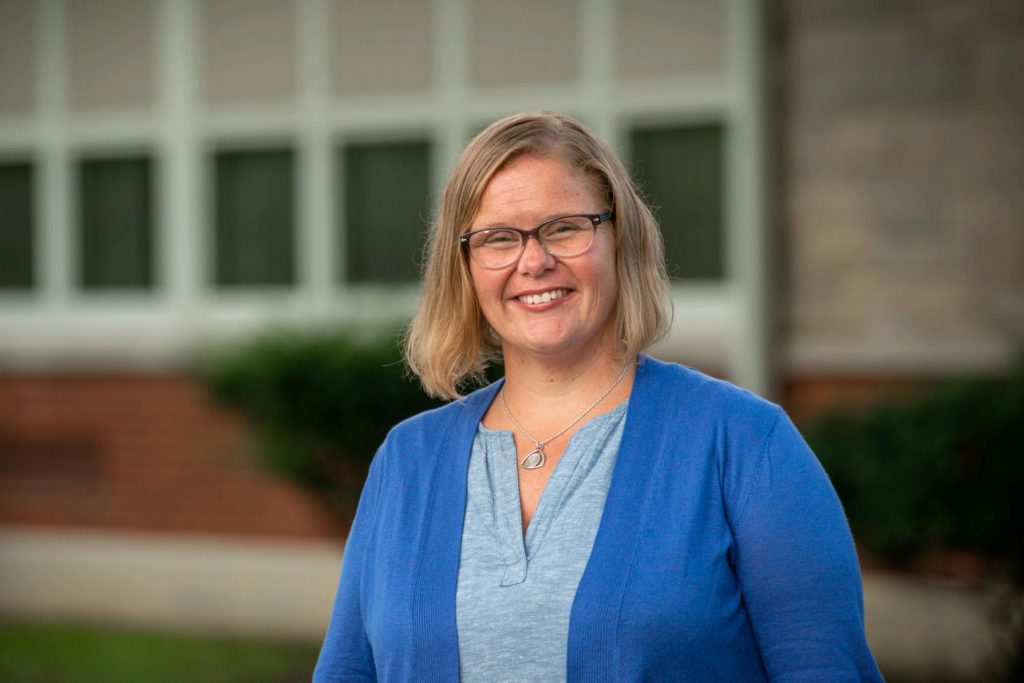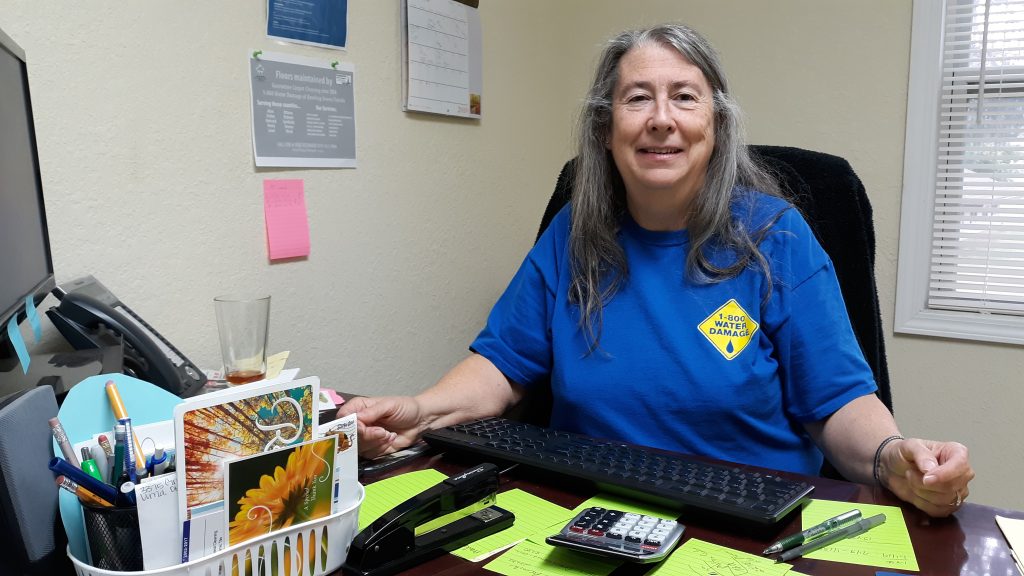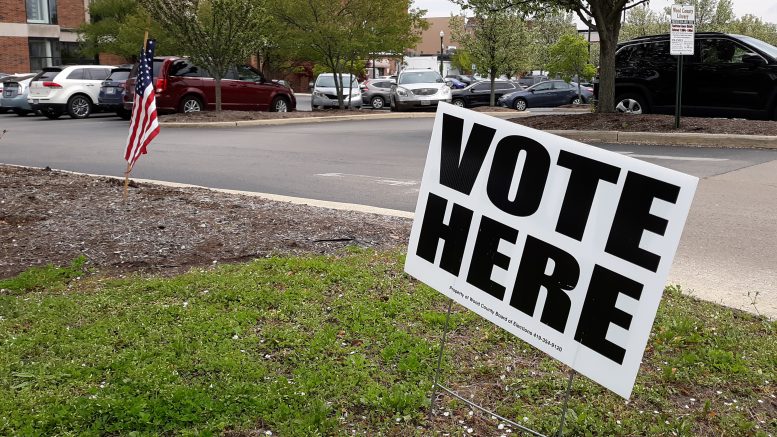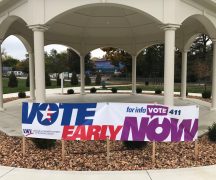By JAN LARSON McLAUGHLIN
BG Independent News
The competition for seats on the Bowling Green Board of Education is stiff, with eight people running for three open seats.
The candidates are Jill Carr, Grant Chamberlain, Tracy Hovest, Ryan Myers, Brian Smith, Ginny Stewart, Richard Strow and Peggy Thompson.
The race includes diverse candidates – with some solidly in support of the new elementary school, and some adamantly opposed.
Following is information on six of the eight who made time for interviews with BG Independent News. The two others – Grant Chamberlain and Brian Smith – said they would check their calendars for interview times, but failed to respond with available times over a two-week period.

Jill Carr, who is serving her first term on the board, would like to see the building issue through to completion.
“I don’t feel like my work is done,” she said.
Her first term on the board has been a learning experience, said Carr, who retired after 40 years working in student affairs at Bowling Green State University. And she is committed to getting the building issue to the next stage.
“I’m very much in favor of the community school,” she said.
Other districts have also struggled with the idea of reducing the number of elementary schools to one community school. But they have consistently been happy with the decision once its done, Carr said.
“After they build, the people really like them,” she said.
The benefits include getting rid of labels from individual elementaries, a better use of teaching resources, and better educational methodology.
Plus, she said, the Ohio Facilities Construction Commission’s review of Bowling Green’s three elementaries showed that two would cost more to renovate than to build new.
“We need a new facility,” she said.
Carr rejects the argument that the school district is trying the same building issue after two failures on the ballot. This issue on the November ballot is much different, she said, pointing out that the last attempt was for $72 million over a period of 37 years. This attempt is for $40 million over 30 years. And instead of a pure property tax, this issue is split equally between an income and property tax.
“We listened,” and made changes, she said. “We have to be accountable to our taxpayers.”
As for the district’s less than stellar grades on the state report cards, Carr said the board and administration are working to modify curriculum to better prepare students.
Carr emphasized that the standardized test scores are often linked with the socio-economic status of the students. And that doesn’t help Bowling Green’s scores.
“We’re seeing a change in the demographics in Bowling Green,” she said. There are more struggling families and more students qualifying for free lunches.
“It’s not a good indication of what we’re about,” she said of the tests. “It’s a conundrum.”
The students consistently score well on the portion of the tests measuring growth from one year to the next. However, Kenwood and Crim elementaries have seen low scores on the third grade reading tests.
Making the issue more difficult is the level of reading skills that students have when they arrive in kindergarten. The range in Bowling Green is wide, she said, with some students having to spend a great deal of time catching up.
The district’s new curriculum director has identified some weaknesses in the phonics education, and changes are being made, Carr said.
“With greater emphasis on that, we’re hoping the scores improve,” she said. “We’re finding the right areas to emphasize.”
Carr sees a need for school districts to make it clear to the state that the report cards are not a true measure of the students’ skills.
“We need to be getting more involved at the state level,” she said. “We need to let them know what we are dealing with on an everyday basis.”
Carr said complaints about the school board’s lack of transparency are unfounded.
“I disagree,” she said. “I think we have been very transparent.”
The board held public workshop meetings on the levies, and members are accessible to the public.
“All of us are available if people want to talk to us,” she said.
And now that the district’s finance system is compatible with the state checkbook system, the board is considering joining.
“I definitely think we should look into that. Nobody’s ever been opposed to it,” she said.
“I think we have a very forward looking school district. We have fantastic teachers. We have strong leaders in the administration and the board,” Carr said. “If we can move our facilities ahead, we’ll be that much better.”

Tracy Hovest sees serving on the school board as an extension of her dedication to students.
“My entire life I’ve spent advocating for kids,” said Hovest, who is in her 20th year of teaching at Washington Local Schools.
“I’ve always been a believer in fighting for good,” she said. So why stop now? “I want to be part of the solution and not part of the problem.”
Hovest is a familiar face at meetings of the school board and school workshops. She has a child at Conneaut, and served on both school task forces. And she is a vocal supporter of the “One Community, One School” concept.
“I would never fight for something not worth fighting for,” she said. “I want our kids to have better. They deserve to have the facilities to meet every child’s needs.”
As a member of the facilities task force, Hovest saw the tight conditions at Bowling Green’s elementaries – with kids being taught in closets and on the gym stage. Students should not be “sardined” into small classrooms, she said.
“I want people, when they go to vote, to remember what is best for kids,” she said.
Hovest said she is troubled by the misinformation and “fear-mongering” being engaged in by those opposed to the school building issue. She is not afraid to respond with the facts, she said.
“That’s who I am. I stand up for what’s right,” she said. “This board is not dividing the community. They want what’s best for the community.”
Despite claims that the levy unfairly burdens farmers, Hovest pointed out the fact that the new income tax/property tax proposal would cost farmers much less than a pure property tax. The change drops the amount from more than $6 an acre to a little over $1 per acre a month – a good compromise, she said.
“We’re trying to make this manageable for everybody,” Hovest said, noting her family history in agriculture. “I have empathy for them because of what I’m rooted in.”
One community elementary school will best serve students, she said, by putting all resources in one location, making class sizes equitable, allowing for more teacher collaboration, and lessening the divide between elementaries.
“That would definitely address the concerns of the state report card,” she said.
Hovest defended the current board’s transparency to the public.
“I feel like they’ve done a good job of keeping people in the loop,” she said. “I think they’ve bent over backwards.”
And she supports efforts to sign up for the state checkbook program, if the district feels it’s needed.
“Nobody is getting rich in education,” she said.
Hovest believes a new elementary would not only benefit students, but also the community by attracting new residents and new businesses.
“People will want to move here with a newer school,” she said. “I believe in the greater good. I want what’s good for not only our kids, but also our community.”
If elected, Hovest’s goals include maintaining or increasing student services for special education and gifted children.
“I would also like to get more teachers’ input. They are in the trenches,” she said.
“I am willing to do my homework,” she added.

Ryan Myers brings a broad spectrum of education expertise and experience to his campaign for school board.
During his 20 years in education, he has served as a special education and behavioral needs teacher, and he has supervised and directed a program with 349 employees. He has worked with more than 40 school district, has both his school principal and superintendent license, and currently works as supervisor of special education services at Penta Career Center.
“I truly do offer a perspective that no one else has,” said Myers, who has two children at Kenwood.
And he would like to use that experience on the school board.
“I really felt like I could come in and make a difference,” he said. “I enjoy having discourse with people when we don’t agree.”
Myers said he is “100 percent” for the One Community One School concept.
“I’ve been part of districts that have gone through levy failures,” he said. And he has seen communities want to hang onto old buildings for the sake of nostalgia. But consistently, when they consolidate, people are pleased with the outcome, he said.
“That’s one of the biggest benefits you can offer a student with special needs,” he said of the team teaching concept that works best in consolidated sites.
Currently, the elementaries work with special needs students in hallways, closets or space on gym stages.
“There’s no room,” he said. “It’s not an environment conducive to advancing a student,” he said.
As for the state report cards, Myers looks at the process from the perspective of someone in the educational system. He agrees that the poor literacy skills for third graders is “alarming.”
However, he also points out that Bowling Green is judged on the same scale as Perrysburg – though 80 to 90 percent of Perrysburg kindergartners are coming into school with acceptable skill levels compared to 50 percent in Bowling Green. So Bowling Green students have much further to go to reach that third grade standard.
“It is unfair, but it’s the rules,” he said.
“Our teachers are doing a fantastic job of teaching” and helping students catch up.
A larger percentage of Bowling Green students also face issues related to poverty – which means literacy is sometimes not their priority.
So Myers would like to beef up preschool initiatives. “That makes a huge difference,” he said. He would like to work more closely with BGSU on providing reading labs.
“I want to attack the literacy issue,” he said.
As for complaints about the school board’s transparency, he defended the board.
“I think they’re all good people and they’re on there for the right reasons,” he said.
He does support the district enrolling in the state checkbook program, so expenses are more available to the public.
Myers also wants to improve teacher retention, by offering competitive salaries and involving staff in sharing the district’s vision.
“I want us to be the place people strive to go – and stay,” he said.

Ginny Stewart, the current school board president, is passionate about giving students one community elementary school – and wants to keep working toward that goal.
“I’m not done. I feel so passionately about what our schools are doing for our students in very difficult environments,” she said.
“Morally, I think it’s wrong” to not provide better learning environments, she said. “I want to see this thing through.”
Stewart, whose previous work experience includes human resources and organizational development at Phoenix Technologies, then owner of Ginny’s Inspired Fashions downtown, believes one school would offer the best educational and co-curricular opportunities.
“Right now there is a disparity between the services” based on socio-economic issues. And that has led to disparaging labels associated with some of the elementaries.
“What we really need to be is Bobcats,” all getting the same equitable resources, she said. “Our buildings just can’t accommodate what these kids need.”
Stewart talked about the board’s tour of the consolidated Defiance elementary school, which has similar demographics to Bowling Green.
“It was jaw-dropping. It wasn’t hectic,” she said. There were no children learning in the hallways – unlike currently at Bowling Green. There was a healthier environment in the new building – unlike the 65-year-old elementaries here.
“We can keep our kids safer and more secure in that environment,” she said.
Bowling Green needs to invest in its children, Stewart said.
“If you look all around us,” all other schools in the county have updated or new facilities that are attracting young families.
“This community will not thrive” unless it gets a new elementary, she said. “It is the single most important economic development issue that this community needs.”
A new community elementary will also help Bowling Green improve its state report card scores.
“With a community school we will go out of the Ed Choice program, and have the opportunity to teach equitably,” she said.
The state report cards don’t take into consideration the high number of low income homes at some elementaries. The grades don’t take into consideration the children without food at home, or without help with homework, she said.
“It’s such an indictment on poverty,” she said of segregated education.
While the state grade card results have fluctuated, the district consistently earns state “Momentum Awards” based on measuring a full year of learning.
“We are showing learning growth of our students,” she said.
Stewart disputes accusations that the current school board is not transparent.
“I would challenge anyone to find a school board as transparent as we are,” she said. And now that the district’s software has been updated, it is likely the board will sign up for the state checkbook to keep the public more up to date.
Stewart also wants to make sure the district continues hiring and retaining quality teachers.
It is important for Bowling Green to stay competitive with its hiring practices and keep up with best administrative practices, teaching methodology and safety training.
She also has a goal of getting more community volunteers in schools.
“I would like to see this community become more involved in our schools,” she said.
“I really want to work with people in the community and educational experts in the district on the new school,” she said.

Richard Strow believes it’s past time for rural areas of the Bowling Green City School District to have representation on the school board.
“We’ve got to get a voice for people out in the country,” said Strow, who lives near Milton Center and works as an agronomist at the Ridgeville grain elevator in Henry County.
The school board hasn’t had a member from outside Bowling Green city limits for more than 20 years, he said.
“I’d like to provide a voice and a set of ears for people in the country who feel like they aren’t being heard.”
As for the upcoming levy for one community elementary school, Strow is conflicted. He served on the school financial task force and voted for the combination income/property tax – but for sticking with three elementary buildings.
“I’m very torn right now,” he said.
Strow wants to hear from local building industry people about the condition of the district’s three elementaries.
“I don’t necessarily trust” the opinions from state officials who ruled that two of the three elementaries should be replaced rather than renovated.
He believes smaller schools would benefit students more than one consolidated building. He questions how the consistent family connections can survive in a large elementary. And he sees smaller schools as better for students with anxiety or learning disabilities.
“It’s just too many kids at one place,” he said.
Strow is also opposed to the possibility of grade level elementaries, if the levy does not pass. Instead, he would rather see the schools move district lines to balance out classroom sizes.
He has concerns about the state report card scores that show low reading proficiency in third graders and lack of preparedness at the high school level.
As for the “Ed Choice” designation at Kenwood Elementary, Strow said the district needs to make it an “all hands on deck” situation.
“It’s sad. It’s disappointing,” he said.
“We’ve got to find a way to really expand the reading program for the kids,” he said. He suggested a summer satellite reading program that would travel to communities, possibly paying young teachers to accompany a bookmobile and holding programs in public sites.
“If we can’t budge this gap in reading, we’re never going to see any advancement,” he said.
Strow also believes more volunteerism needs to be encouraged at the schools.
“We’ve got a community that wants to support schools,” he said.
As for the high school students, Strow said the state testing shows too few are “prepared for success.” He suggested that in addition to giving students time off to visit colleges, that they should also be given time to experience various trades.
“We should get away from the idea that every kid’s got to go to college.”
Strow would like to see more transparency on the part of the school board. Simply listing a few pages of basic financial information on the board agendas would help.
“That takes away all the complaints about financial transparency,” he said. “It cleans up distrust in the community right now. I think transparency is an issue. It’s an easily fixed issue.”
He supports the district signing up with the state checkbook program.
And he would like citizens to have an opportunity to have their questions answered at board meetings.
Strow also wants to see the division over the school issues to be smoothed.
“We’ve got to heal the divide. Neighbors can’t talk,” he said.
And if elected, he would like to see someone on staff assigned to pursue grant funding to take the pressure off taxpayers.
“We’ve got to be going after grants, and going after them hard. There’s money out there.”

Peggy Thompson knows Bowling Green City Schools – as a parent, grandparent, Breakfast Buddy volunteer, and a recent retiree as an accounts payable clerk after 32 years with the district.
“I’ve got some skin in the game,” she said of the seven of her nine grandchildren who attend BG City Schools.
Thompson sees a need for more diversity on the school board – specifically someone more conservative and less connected with Bowling Green State University.
“I’ve always felt that we need to have some conservative” views on the board, she said.
“It seems like the board has been mostly BGSU related, and not related to all the community,” she said.
Thompson is strongly opposed to the idea of one community elementary for Bowling Green.
“I just don’t like the one community school,” she said.
She points out her weekly visits with a Crim Elementary first grader in the Breakfast Buddy program.
“There’s a massive sea of kids,” already at Crim, she said. She fears that combining all the elementary students together will mean a loss of connection between the students, teachers and staff.
“They call every child by name now when they come through the cafeteria,” she said.
And the pickup routine everyday when school ends is already chaotic and congested, she said. “These elementaries are a zoo on a good day.”
Thompson also does not like the idea of moving students every two years, if the three elementaries are changed to house two grades levels each in order to even out class sizes.
“That seems like a lot of disruption,” she said.
And she’s not fond of leveling out classroom numbers, since some students learn better in less crowded classrooms.
Instead, she suggested that students with greater needs get more one-on-one help from community volunteers and reading specialists. Some children don’t have help at home, so summer intervention would be important.
“If we have to throw money at it, we have to throw money at it,” she said. “We’ve got to get some boots on the ground.”
Thompson believes the community has plenty of volunteers who could commit one hour a week to help students. “If it can help one kid reach their goals” people would be willing to help, she said. “Most people have an hour they can give every week.”
She worries that the district is not preparing older students for the workplace or for college. She would like to see more entrepreneurs come in to discuss careers, and more coordination with BGSU and Penta Career Center.
“We’re not preparing them enough,” she said. “Not everyone is geared for a four-year college degree.”
As for complaints about the current board’s transparency, Thompson said she shares those concerns “to some extent.” She would like to hear more discussion at board meetings, so the public understands the reasons behind the decisions being made. And she would like to see district expenses outlined and explained – so signing up for the state checkbook would be helpful.
“I like to look at the numbers to see what is going on,” she said.
If elected, Thompson’s top goals would be to improve the literacy levels of students.
“I want the kids to succeed. They’ve got to be able to read,” she said.
“The kids are our goal and we need to put them first,” she said. “It breaks my heart when these kids struggle when they don’t need to.”





